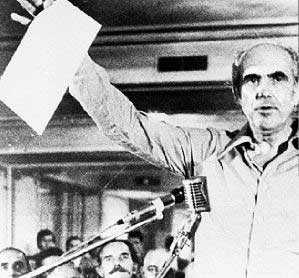|
|
The Panhellenic Socialist Movement, better known as PASOK (Greek: Πανελλήνιο Σοσιαλιστικό Κίνημα, Panellinio Sosialistiko Kinima, ΠΑΣΟΚ), is a Greek social democratic political party. In the 1980s, the PASOK was the first socialist government in Greece since the start of the Cold War, and ruled Greece for most of the 1980s and '90s. PASOK lost office at the March 7, 2004, Greek elections.
Andreas Papandreou, 3 September 1974, foundation and declaration of PASOK PASOK was established on September 3, 1974 following the fall of the Greek military regime and the restoration of democracy. Its founder was Andreas Papandreou, the son of the late Greek liberal leader George Papandreou. Its founding principle were "National Independence, Popular Sovereignty, Social Emancipation, Democratic Process." At the November 1974 elections PASOK received 13.5% of the vote and won 15 seats (out of 300), coming third behind the conservative New Democracy party of Konstantinos Karamanlis and the liberals of George Mavros. At the November 1977 elections, however, PASOK eclipsed the liberals, doubled its percentage of the vote and won 92 seats, becoming the official opposition. In October 1981 PASOK won national elections with 48% of the vote, and capturing 173 seats and forming the first socialist government in the history of Greece. Although Papandreou had campaigned on opposition to Greek membership of NATO and the European Economic Community, he gradually changed his policy towards both institutions. In 1985 the PASOK government revised the Greek Constitution to remove most powers from the President and to give wider authority to the Prime Minister and the Executive Government. Many other sweeping social reforms were carried out[citation needed]. At the June 1985 elections PASOK got 45% of the vote and won 161 seats, thus securing a stable parliamentary majority. In June 1989, however, the PASOK vote fell to 40%, with opposing New Democracy at 46% of the popular vote. PASOK had changed the electoral law a year before elections, in order to require a higher-than-50% majority to form government, so the legislature was deadlocked. Another election in November produced the same result. After a prolonged political crisis, a third election in April 1990 brought New Democracy back to power, although its 7% advantage in popular vote, amounted to a very slight majority of only one MP out of 300. In opposition PASOK underwent a leadership crisis when Papandreou was prosecuted over his alleged involvement in the Bank of Crete scandal. He was eventually acquitted, and at the October 1993 elections came back to power. His re-election was considered by many a vote of confidence of the public against his prosecution. In 1995, however, Papandreou's health began to deteriorate and PASOK was racked with leadership conflicts. In January 1996 Papandreou was forced to retire after a protracted three-month long hospitalization, during which he kept prime ministership (he eventually died six months later). He was succeeded by Costas Simitis, the candidate of the modernising, pro-European wing of PASOK, who won an internal vote against Akis Tsohatzopoulos, a Papandreou confidant. Right after his election Simitis faced the biggest crisis in Greek politics for over 20 years, the Imia conflict. Simitis was criticized for his soft stance against Turkey and especially for thanking in public the American intervention. Although the Imia incident somehow tarnished his image, the country's economic prosperity and his matter-of-fact administration won him the September 1996 general election, Under Simitis' leadership, PA.SO.K. had two major successes: In September 1997 Greece won the right to stage the 2004 Olympic Games and later it was confirmed that the country would be included in the Euro-zone. Simitis won another term in April 2000, winning 43.8% of the vote and 158 seats: a substantial achievement for a party which had been in power almost continuously for nearly 20 years. In 2000, after the assassination of Brigadier Saunders by the terrorist group 17 November (17N), and especially with the forthcoming Athens Olympics being a major terrorist target, unprecedented pressure was exerted on the PASOK authorities to terminate this organisation. Much of the western media had gone as far as accusing PASOK of colluding with the terrorists. The government intensified their efforts and finally, with a string of events starting at June 29, 2002, 17N members were captured and tried. Nevertheless, PASOK was losing his traditional appeal to the Greek lower and middle classes. In order to revitalize PASOK's chances for the next elections, Costas Simitis January 7, 2004 announced his resignation as leader of PASOK. He was succeeded by George Papandreou, son of Andreas Papandreou. PASOK hoped that Papandreou could reverse the slide in the opinion polls which saw the opposition New Democracy party under Costas Caramanlis 7% ahead at the start of the year. But although Papandreou reduced ND's lead in the polls to 3%, he was unable to reverse the view of a majority of Greek voters that PASOK had been in power too long and had grown lazy and corrupt. ND had a comfortable win at the March 7 elections, placing PASOK in opposition after eleven years in office. Shortly after, ND did a financial audit and went on to accuse PASOK of having falsified Greece's macroeconomic statistics, on the basis of which the European institutions accepted Greece to join the Euro zone. PASOK is a member of the Party of European Socialists and the Socialist International. In the European Parliament it has 8 out of 24 Greek MEPs. On 31 January 2006, George Papandreou was elected President of the Socialist International, the worldwide organisation of social democratic, socialist and labour parties. Links
Greek: Retrieved from "http://en.wikipedia.org "

|
||||||||||||||||||||||||
|
|



